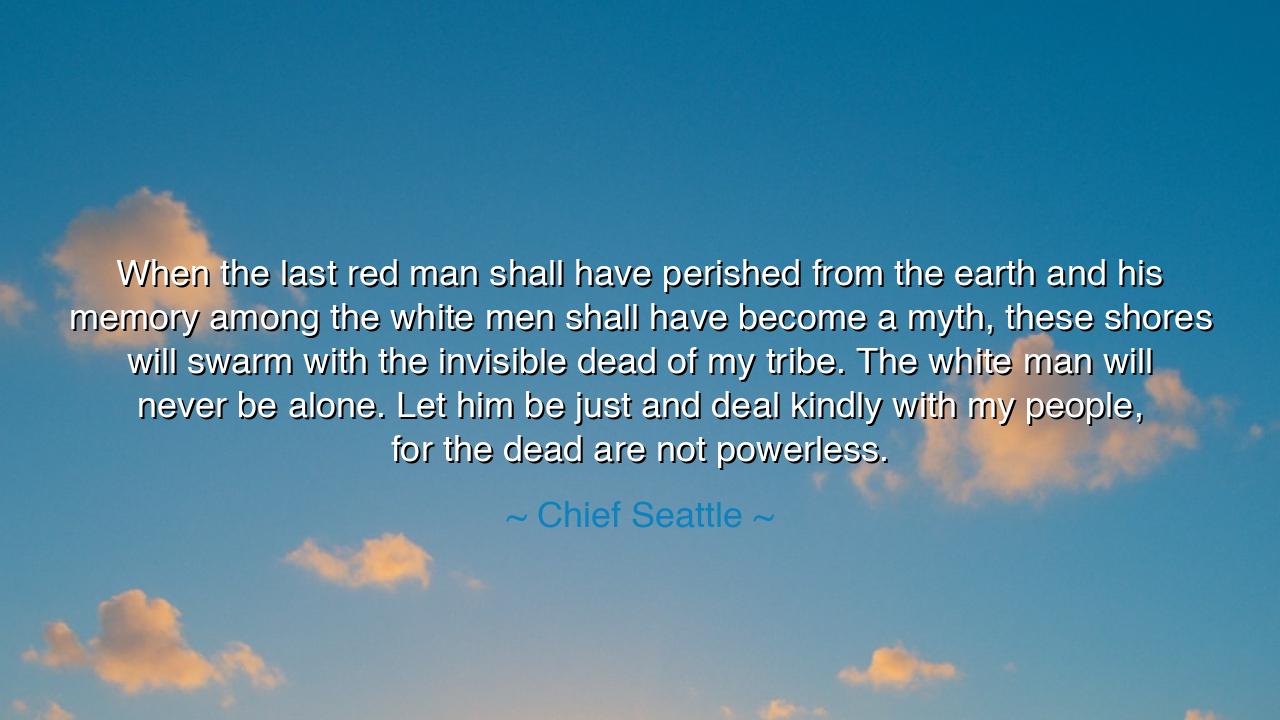
When the last red man shall have perished from the earth and his
When the last red man shall have perished from the earth and his memory among the white men shall have become a myth, these shores will swarm with the invisible dead of my tribe. The white man will never be alone. Let him be just and deal kindly with my people, for the dead are not powerless.






“When the last red man shall have perished from the earth and his memory among the white men shall have become a myth, these shores will swarm with the invisible dead of my tribe. The white man will never be alone. Let him be just and deal kindly with my people, for the dead are not powerless.” — thus spoke Chief Seattle, the Duwamish and Suquamish leader whose words rise like a wind through time, echoing the eternal cry of a people bound to their land, their ancestors, and the spirit that breathes through all creation. In this solemn utterance, Chief Seattle proclaims that the bond between his people and the earth cannot be severed by death, nor can conquest silence the spirit of the land. His voice is both a warning and a blessing — a call for justice tempered with mercy, and a reminder that the past is never truly gone.
The origin of this quote reaches back to the mid-19th century, during the period of westward expansion in the United States. In 1854, as treaties were being drawn between Native tribes and the American government, Chief Seattle delivered a speech to Governor Isaac Stevens. His people were facing displacement from their ancestral lands — lands they had lived upon for thousands of years, lands that carried the bones and memories of their forefathers. Outnumbered and overpowered, Seattle spoke not as a man seeking pity, but as a prophet of permanence, affirming that the spirits of his people would remain, watching, guarding, whispering through the rustling leaves and the lapping waters.
The meaning of his words is layered with both sorrow and sacred truth. Chief Seattle recognized that his tribe’s physical presence might fade beneath the advancing tide of colonization, but their spiritual presence — their unity with the land — would endure. To the indigenous mind, the earth is not an object to be owned, but a living being to be revered. Every stone, every river, every gust of wind carries the breath of those who have walked before. Thus, even if the “red man” perishes in body, he remains in spirit — woven into the soil itself. In this way, Seattle reminds the white man that his dominion is an illusion: though he may build cities and claim the land as his own, he walks still upon the sacred ground of those who came before.
There is both compassion and warning in his plea: “Let him be just and deal kindly with my people, for the dead are not powerless.” These are not the words of vengeance, but of moral reckoning. Chief Seattle speaks of a spiritual law deeper than human justice — the law of harmony between man and nature, life and death. To act unjustly toward the earth or toward one’s fellow man is to invite imbalance, for the spirits of the wronged never sleep. They live in memory, in the conscience, and in the quiet unrest of a wounded world. His message carries an echo for all generations: if humanity forgets its kinship with creation, the very earth will rise to remind it.
Consider the story of the Ghost Dance, which swept through the Plains tribes decades after Chief Seattle’s time. Born from desperation, it was a ritual meant to summon the spirits of ancestors to renew the world and drive away suffering. Though tragically crushed, its power lay not in its outward success, but in its testimony of hope — that the dead, indeed, are not powerless. Across time, they continue to inspire resistance, healing, and remembrance. The dance lives on as a symbol that spirit cannot be conquered by the sword nor erased by the march of empires.
Chief Seattle’s wisdom reaches far beyond his century. His prophecy speaks to the modern world, where the land groans under the weight of human neglect. The forests burn, the waters choke, and the winds cry with a voice that sounds almost human. These are not coincidences, but consequences — the very spirits of the earth mourning the loss of reverence. The invisible dead of Seattle’s tribe, and of all peoples who loved the land, still walk among us, urging a return to balance. His message is a call to humility — to recognize that the world is not ours to exploit, but ours to protect, to honor, to share.
The lesson, then, is clear and eternal: live in reverence. Treat the earth and her children — human and more-than-human — with justice and kindness. Remember that the past is not buried but breathing; the dead are never gone, for they live in the air we breathe, the rivers we drink from, the memories that shape our conscience. To walk justly upon this earth is to honor both the living and the dead. To act with compassion is to keep the ancient covenant between man and nature unbroken.
So let Chief Seattle’s words echo through the generations: “The white man will never be alone… the dead are not powerless.” These are not words of threat, but of sacred remembrance. For the land itself remembers, the wind remembers, and the spirit of every life that has ever touched this soil remembers. When we walk gently, we walk with them; when we act justly, we act for them. And when we forget — they rise, unseen but ever near, to remind us that all of creation is bound together, and that no soul, living or dead, is ever truly alone.






AAdministratorAdministrator
Welcome, honored guests. Please leave a comment, we will respond soon